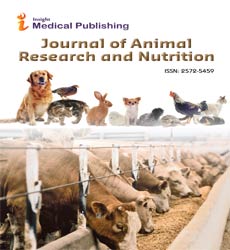Animal Free Strategies National Dietary Recommendations
Maria Venema*
Department of Animal Nutrition, Wageningen University & Research, Wageningen, Netherlands
- *Corresponding Author:
- Maria Venema
Department of Animal Nutrition, Wageningen University & Research, Wageningen, Netherlands
E-mail: venama_m@gmail.com
Received date: September 11, 2022, Manuscript No. IPJARN-22-14987; Editor assigned date: September 13, 2022, PreQC No. IPJARN-22-14987 (PQ); Reviewed date: September 24, 2022, QC No. IPJARN-22-14987; Revised date: October 04, 2022, Manuscript No. IPJARN-22-14987 (R); Published date: October 11, 2022, DOI: 10.36648/2572-5459.7.10.050
Citation: Venema M (2022) Animal Free Strategies National Dietary Recommendations. J Anim Res Nutr Vol. 7 No10: 050
Description
The genetic selection of the growth performance and nutrient optimization in domestic animals has significantly increased their growth performance and shortened their growth cycles. The selection is usually accompanied by increasing metabolic processes that might compromise the immune capacity in the body, leading to the occurrence of epidemiological diseases and retardation of animal growth.
Antibiotics Growth Promoters
To overcome these issues, the use of Antibiotics Growth Promoters (AGPs) was widely adopted in the feed industries. Particularly, AGPs have been used as a growth promoter for a long time to maintain gut health and improve feed conversion efficiency. However, the use of AGPs has been gradually banned in recent years worldwide due to their harmful roles in disturbing healthy intestinal micro biota and developing antibiotic resistance. Therefore, the use of AGPs in animal feeding has been gradually banned in recent years worldwide. However, banning the use of AGPs may increase the risk of conditioned pathogen infection in domestic animals and increase the feeding costs, meanwhile; it might increase the risk of infection in human beings. These situations highlight the need to explore novel alternatives to AGPs, which can support the productive potential and maintain the health of domestic animals. Recently, several classes of AGPs replacers have been studied and suggested, such as probiotics, prebiotics, antimicrobial peptides, polysaccharides, feed enzyme additives. However, these substitutes have been found not as effective as antibiotics in micro ecological modulation. Hence, exploring new approaches to decrease the immune and metabolic disorders related to no use of AGPs warrants investigating.
Immune Function of Animals
The main reason for using antibiotics in domestic animals is to inhibit pathogenic bacteria and to regulate immune functions in the gut, so the growth performance can be improved. This approach could also be replaced with applying those nutrients that have trans generational epigenetic effects on immune function and the regulation of metabolic processes. Yet, a large number of in vitro studies have shown that some macronutrients such as fat and protein, and some micronutrients including vitamins could be involved in epigenetic regulation. These dietary nutrients could regulate immune and development processes in four epigenetic regulatory ways. The trans generational epigenetic inheritance induced by paternal nutrition supplementation has been widely suggested in human offspring health and disease regulation. In comparison, limited study has been performed to study the paternal nutritional effects on offspring metabolism and growth.
Firstly, some nutrients can act as methyl or acetyl donors, or act as the conferment of methylation and acetylation-related enzymes that participate in the DNA methylation and histone modification of the genes involved in the growth and immunity. For instance, folic acid, choline, betaine, and methionine contribute to the one-carbon metabolism that is directly involved in DNA methylation or histone regulation, which plays the roles in the regulation of gene expression of lipid and glucose metabolism, immune function, and nucleic acid metabolism. Sinclair et al. reported that the restriction of the folate, methionine and another one-carbon metabolism related metabolites during pregnancy could reduce the methylation level of CpG Island in the offspring genome, which could lead to preterm delivery and abnormal development of the offspring; Timely folate supplementation could reverse these effects by altering the genomic DNA methylation. Another study in chicken demonstrated that paternal folate supplementation could have trans-generational regulation on the lipid and glucose metabolism in broiler offspring, where the energy utilization was improved by increasing gluconeogenesis and glycolysis while reducing lipid catabolism. Furthermore, the sperm DNA methylation was involved in the methionine synthase reductase mutation-induced offspring abnormal development. In addition, vitamin B6, vitamin B12, alpha-ketoglutarate, Fe2+, vitamin C (ascorbic acid), and Zn2+ all act as the cofactors to these enzymes that are involved in the one-carbon metabolism or directly serve as the coenzyme of DNA methyltransferase, Tet, and Histone Deacetylase (HDAC) enzymes. These nutrients could also influence DNA methylation or histone methylation process and then regulate the metabolism and development process of the offspring. Except for the methyl donors, nutrients functioning as acetyl donors can affect histone acetylation through the gene expression process. Briefly, the metabolism of glucose, lipids, and proteins are all involved in acetyl-coenzyme A (Acetyl-CoA), which serves as the main donor of acetyl moiety. Thus, these nutrients could be associated with the regulation of offspring immune function and growth through histone acetylation modification.
Comparing trans generational epigenetics with traditional genetics, they both have the trans-generational inheritance ability, but trans-generational epigenetics relates to the gene expression alteration that gradually adapts to the resulting environmental changes, likely being continuous, rather than gene mutation or the significantly increased frequency of one genotyping in traditional genetics. Herein, it refers to the phenotypic alteration of the offspring without DNA sequence changes. Studies on the mechanisms have found that environmental factors could cause the alterations of DNA methylation, histone modifications, and non-coding RNA expression, leading to the changes in gene expression and physiological phenotypes in parent animals, and as a result, phenotypic alterations appear in their offspring. In a rat model, transient exposure of the gestating females during the period of gonadal sex determination to the endocrine disruptors, vinclozolin (an antiandrogenic compound) or methoxychlor (an estrogenic compound), induced a decrease of spermatogenic capacity (cell number and viability) and an increase of incidence of male infertility in the adult F1 generation. These effects were transmitted through the male germline to nearly all males of subsequent generations. The trans-generational effect seemed to be associated with the altered DNA methylation patterns in the germline. These results prove that the environmental memory in animals could be transmitted to the offspring through paternal trans-generational epigenetic mechanisms.

Open Access Journals
- Aquaculture & Veterinary Science
- Chemistry & Chemical Sciences
- Clinical Sciences
- Engineering
- General Science
- Genetics & Molecular Biology
- Health Care & Nursing
- Immunology & Microbiology
- Materials Science
- Mathematics & Physics
- Medical Sciences
- Neurology & Psychiatry
- Oncology & Cancer Science
- Pharmaceutical Sciences
